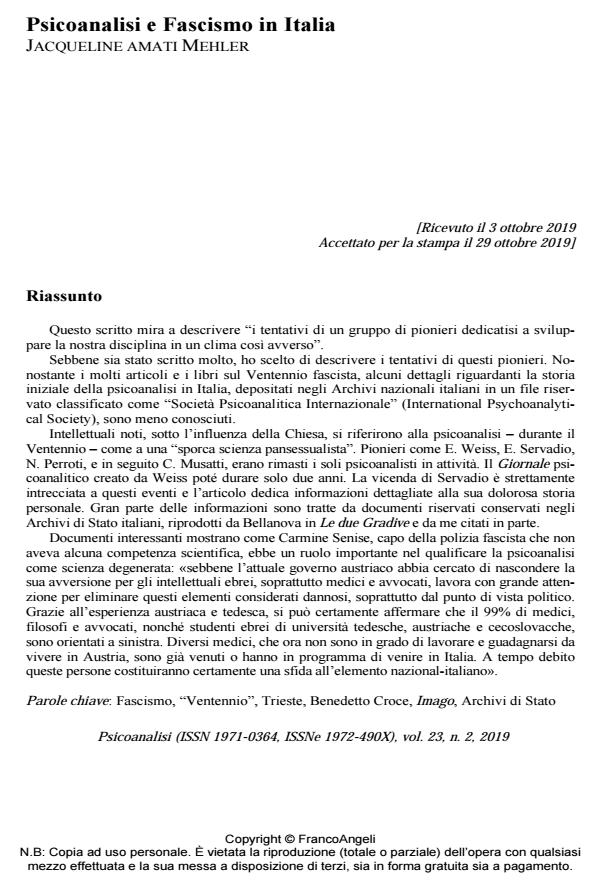Psychoanalysis and Fascism in Italy
Journal title PSICOANALISI
Author/s Jacqueline Amati Mehler
Publishing Year 2020 Issue 2019/2 Language Italian
Pages 19 P. 7-25 File size 199 KB
DOI 10.3280/PSI2019-002002
DOI is like a bar code for intellectual property: to have more infomation
click here
Below, you can see the article first page
If you want to buy this article in PDF format, you can do it, following the instructions to buy download credits

FrancoAngeli is member of Publishers International Linking Association, Inc (PILA), a not-for-profit association which run the CrossRef service enabling links to and from online scholarly content.
This paper aims to describe "the attempts of a handful of dedicated pioneers to develop our discipline in such an adverse climate". Although a lot has been written I have chosen to describe the attempts of a handful of ded-icated pioneers to develop our discipline in such an adverse climate. Also, despite many arti-cles and books about the Fascist Ventennio, some details regarding the early saga of psychoa-nalysis in Italy, deposited in the Italian National Archives in a confidential file classified as "Società Psicoanalitica Internazionale" (International Psychoanalytical Society), are less known. Well known intellectuals, under the influence of the church, referred to psychoanalysis - during the Ventennio - as a "dirty pansexualist science". Pioneers like E. Weiss E. Servadio, N. Perroti and later C. Musatti had been the only practising psychanaysts. The psychoanalytic Journal created by Weiss could last only two years. The saga of Servadio are losely inter-twined and the paper dedicated detailed information about their personal painful saga. Much of the information is drawn from confidential documents held in the Italian State Archives, reproduced by Bellanova in Le Due Gradive and partly referred to in this paper. Interesting documents show how Carmine Senise, the head of the Police who had no sci-entific competence, had an important role in qualifying psychoanalysis as a debase science: «Although the current Austrian government has tried to conceal its aversion to Jewish intellec-tuals, especially doctors and lawyers, it works with great ability to eliminate these elements considered as harmful, especially from a political viewpoint. From the Austrian and German experience, one can certainly affirm that 99% of doctors, philosophers and lawyers as well as Jewish students of German, Austrian and Czechoslovakian universities are left-oriented. Sev-eral doctors, now being unable to work and make a living in Austria, have already come or are planning to come to Italy. In due time these people will certainly constitute a challenge to the national-Italian element».
Keywords: Fascism, "Ventennio", Trieste, Benedetto Croce, Imago, State Archives
- Bellanova P. (1982). Le Due Gradive. Roma: Edizioni CEPI.
- Bragaglia A.G. (1932). Lo psicoanalista. Critica Fascista, 22: 437-9.
- Croce B. (1967). La Poesia. Bari: Laterza.
- David M. (1990). La psicoanalisi nella cultura italiana. Torino: Bollati Boringhieri.
- Freud Archives in New York: Epistolary between Weiss and Freud.
- Freud S. (1899). L’interpretazione dei sogni. In: Opere, vol. 3. Torino: Bollati Boringhieri, 1966.
- Freud S. (1908). Lettera ad Abraham (4 ottobre 1908). In: Meghnagi D. (2003). Interpretare Freud. Clinica e teoria psicoanalitica. Venezia: Marsilio.
- Freud S. (1927). L’avvenire di un’illusione. In: Opere, vol. 10. Torino: Boringhieri, 1978.
- Freud S. (1933b [1932]). Perché la Guerra. In: Opere, vol. 11. Torino: Boringhieri, 1979.
- Freud S., Jones E. (1908-1939). The Complete Correspondance. Paskauskas R.A. (ed. by). London: Harvard University Press.
- Guerriero V. (1934). Il Dottor Freud. Il Regime Fascista, 22 giugno 1934.
- Jones E. (1953-1957). Vita e opere di Sigmund Freud, vol. 2. Milano: Il Saggiatore, 1962.
- Ludwig E. (1932). Colloqui con Mussolini. Milano: Mondadori.
- Masson J. (1985). Assalto alla verità. Milano: CED.
- Meghnagi D. (2003). Interpretare Freud. Clinica e teoria psicoanalitica. Venezia: Marsilio.
- Meldini P. (1976-2008). Mussolini contro Freud. In: La psicoanalisi nella pubblicistica del Fascismo. Firenze, Rimini: Guaraldi.
- Novelletto A. (1989). Italy in Psychoanalysis. Roma: Istituto della Enciclopedia italiana Treccani.
- Petrucci A. (1939). Osservatore Romano, 1 ottobre 1939.
- Prampolini G. (1938). Ebraismo e Romanità. Il Popolo d’Italia, 31 agosto 38, p. 3.
- Prosperi A. (2008). La Repubblica, 1 ottobre 2008.
- Rende D. (1938). Il pansessualismo di Freud. La Difesa della razza, 5: 43-45.
- Servadio E. (1965). La psicoanalisi in Italia. Rivista di Psicoanalisi, 11, 1: 3-8.
- Weiss E. (1971). Sigmund Freud come consulente. Roma. Astrolabio.
Jacqueline Amati Mehler, Psicoanalisi e Fascismo in Italia in "PSICOANALISI" 2/2019, pp 7-25, DOI: 10.3280/PSI2019-002002